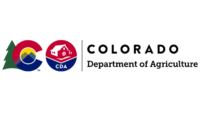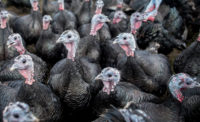Veterinarians play a crucial role in society, safeguarding animal health and welfare while also protecting public health. As part of the National Association of State Departments of Agriculture’s recent campaign to highlight careers in agriculture, Washington State Veterinarian Amber Itle recently shared more about her role’s impact for her community and state and why she loves working for her state’s agriculture department.
"I never envisioned myself in the role of a state veterinarian," Itle said. "I always thought government or regulatory work was bureaucratic and siloed, but that can’t be further from the truth, at least not at the Washington State Department of Agriculture. Working at WSDA, I feel empowered to work with integrity, vulnerability and courage every day to make things just a little bit better for animals in Washington."
Itle further attributed her dedication and appreciation for working for her state agriculture department to Washington State Agriculture Director Derek Sandison.
"Working with Director Sandison has been an incredible experience as he works hard to find solutions to natural resources and climate change challenges across the state, establish strong trade relationships locally and abroad, and influence national policy to address concerns here at home," Itle said. "He is an inspirational leader who promotes a culture of innovation, empowerment and curiosity that fosters collaborative work efforts that benefit agency employees and Washington agriculture alike."
Itle was raised on her family’s dairy farm, participating in all the chores that come with the job from milking the cows to delivering the final products. The farm is not, however, the only commonality Itle shares with her family.
"I grew up under the mentorship of my Dad, who is continuing to practice as a full-time livestock veterinarian after 51 years in practice," Itle said. "My sister also shares the profession as a mixed practitioner of 25 years. I have to admit that I always thought I’d follow in those footsteps because I loved practice, loved being with the animals, loved working with the producers."
She credits her experience on the farm along with her family’s mentorship for giving her insight on the divide between the farmers producing food and the shoppers consuming it, encouraging her to explore different positions in the veterinary field.
"Growing up on my family’s fourth generation dairy farm uniquely informed my perspective to my work as I understood the gap between the producer and the consumer from an early age," Itle said. "I have worked as a producer, a private veterinarian, a livestock market veterinarian, a regulatory field veterinarian and a foreign animal disease diagnostician. Now as the Washington State Veterinarian, my position exists at the intersection of these roles, uniquely positioned at the juncture of producers, practitioners and consumers in communities statewide."
Itle's journey from a successful private practice to the state department of agriculture has been a rewarding one. While she once measured success by immediate animal-care outcomes, she now sees it in her ability to shape policies that benefit animals and humans alike.
"In recent years, our state has adopted the One Health conceptual framework that includes overlapping constructs of animal, human and environmental health when we execute response efforts and to inform policy decisions that impact our communities," Itle said. "I lead the animal health program to protect animal and public health through disease detection, containment and eradication, but we also do this by protecting the economic viability of our food animal industries because we take food security seriously."
Food security may not be a responsibility everyone considers when they think about the daily work of veterinarians. Community health and climate change probably do not come to mind either, yet as part of a One Health approach, Itle examines these threats and others holistically as she and her team execute response efforts to inform policy decisions impacting their state.
"We all know that by only thinking about one element of this conceptual framework, we may miss the importance of the interrelatedness of the work we all do, making decisions that negatively impact another," Itle said. "WSDA has embraced addressing how decisions also impact equity and environmental justice for marginalized communities."
Dr. Itle also serves as secretary of the National Assembly of State Animal Health Officials, which represents state and territorial animal-health officials of the U.S. NASAHO works collectively to safeguard animal and public health and the food supply, acting as a communications network and offering educational resources, publications and research. NASDA and NASAHO share common interests in animal agriculture including foreign and emerging animal diseases, animal biotechnology, antimicrobial resistance and rural veterinary shortages. The organizations continue to work to protect key policy priorities in the farm bill, including the National Animal Vaccine and Veterinary Countermeasures Bank, National Animal Disease Preparedness and Response Program, and National Animal Heath Lab Network. These programs help build resilience in rural communities and protect the food supply through ensuring resources and strategies are in place to prevent animal disease and minimize loss in the event of outbreaks.
Itle said protecting rural communities helps protect human, animal and environmental health as climate change threatens to expand the range of new diseases and pests. In a global world, community outbreaks quickly become statewide – and worldwide – issues as we saw with the COVID-19 epidemic and the recent highly pathogenic avian influenza outbreak.
Itle sums up the responsibility and commitment she has to her department, community and state.
"At the end of the day, as the stewards of animal health in Washington, our vets are here to protect Washington families and the animals in their care through collaboration, education, regulation, preparation and public service."
Ultimately, Itle’s boots-on-the-ground approach, visiting farms, participating in outreach programs and connecting with local producers, exemplifies her dedication as a steward of animal health in Washington.
Source: NASDA



Report Abusive Comment